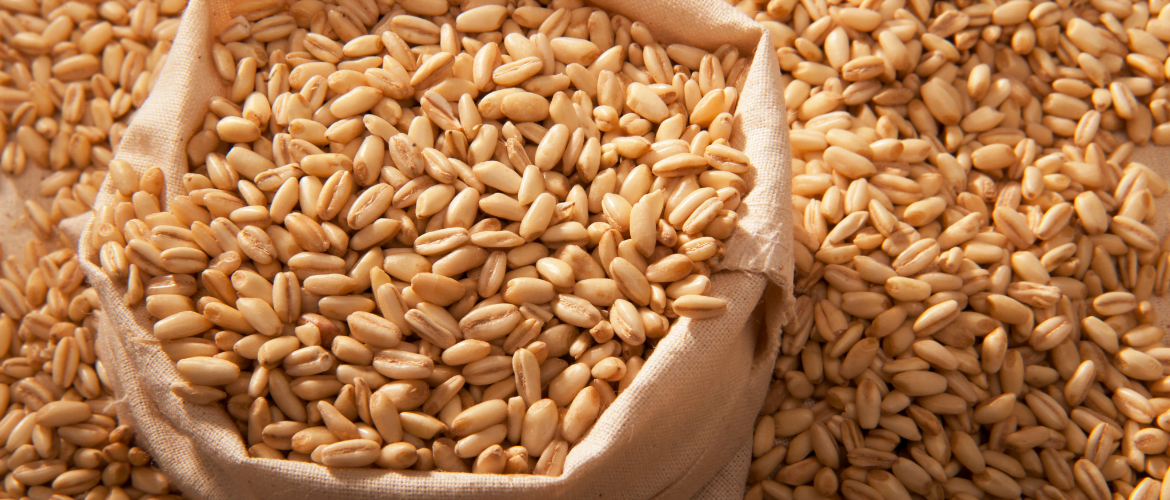
Wheat is a grass widely cultivated for its edible seeds, which we call grains. This is also called as wheat kernel or berry. These kernels are ground into flour, which is used to make a wide variety of foods such as bread, pasta, cereal, and baked goods.
What it looks like:
- Tall stems with physically thin leaves reaching up to 3 feet.
- Seed heads containing small, golden-brown kernels (the edible part).
- Kernels are processed into flour, which is used to make various food products like bread, pasta, cookies, and cereals.
Durga Enterprises are one of the top wheat suppliers and manufacturers that delivers top-quality of it all over the world that is natural, pure and has longer shelf life.
Types of Wheat:
There are several different species and varieties, each with its own unique characteristics and uses. There are several main types of wheat, including:
- Common Wheat (Triticum aestivum): Also known as bread wheat, this is the most widely cultivated type and is commonly used to make bread and bakery products.
- Durum Wheat (Triticum durum): This type is high in protein and gluten, making it ideal for making pasta and couscous(type of pasta made from durum wheat semolina).
- Emmer Wheat (Triticum dicoccum): This is an ancient wheat variety that is often used to make cracked wheat and some specialty baked goods.
Culinary Uses:
Wheat is a highly versatile ingredient that is used in a wide range of culinary applications. Some common foods made from it include:
- Bread: One of the oldest and most widely consumed wheat-based foods is bread and is consumed by almost everyone in many diets around the world.
- Pasta: From spaghetti to lasagna, pasta is a popular and versatile dish made from durum wheat.
- Cereals: It is the primary ingredient in many breakfast cereals, providing a hearty and nutritious start to the day.
- Baked Goods: Wheat flour is the key ingredient in a wide variety of baked goods, including cookies, cakes, and pastries.
Nutritional Value:
Wheat is a rich source of carbohydrates, which provide the body with energy. It also contains protein, fiber, and essential nutrients such as vitamins and minerals. Whole wheat products, in particular, are known for their high fiber content, which is important for digestive health.
Durga Enterprises’ natural wheat production consists of following specifications:
| Sr. No. | Specifications | Amount |
|---|---|---|
| 1 | Calories | 340 kcal |
| 2 | Carbohydrates | 72 g |
| 3 | Protein | 13.2 g |
| 4 | Fat | 2.5 g |
| 5 | Fiber | 12.2 g |
| 6 | Iron | 3.6 mg |
| 7 | Magnesium | 138 mg |
| 8 | Phosphorus | 346 mg |
| 9 | Potassium | 430 mg |
| 10 | Zinc | 2.8 mg |
| 11 | Vitamin B6 | 0.3 mg |
| 12 | Vitamin E | 0.5 mg |
| 13 | Thiamin (B1) | 0.4 mg |
| 14 | Riboflavin (B2) | 0.1 mg |
| 15 | Niacin (B3) | 5.5 mg |
| 16 | Folate (B9) | 44 mcg |
| 17 | Choline | 7 mg per 100 g |

Where it is used:
- Food: Primarily in bread, pasta, pastries, and other baked goods.
- Beverages: Wheat germ can be used in cereals and smoothies.
- Industrial uses: Flour is used in adhesives, textiles, and bioplastics.
- Animal feed: Nutrient-rich outer casing & other byproducts are used in animal feed.
Benefits of Wheat:
It offers various benefits due to its rich nutritional profile and versatile uses. Some of the key benefits include:
- Nutritional Value: It is a good source of carbohydrates, which provide energy, as well as protein, fiber, vitamins (such as B vitamins) and minerals (such as iron, magnesium, and zinc).
- Digestive Health: Whole wheat products are known for their high fiber content, which supports healthy digestion and may help reduce the risk of constipation.
- Heart Health: The fiber in it may have cardiovascular benefits, such as helping to lower cholesterol levels and support heart health.
- Weight Management: Foods made from it, such as whole grain bread and pasta, can contribute to a feeling of fullness, which may aid in weight management.
- Blood Sugar Control: Whole wheat products can have a lower glycemic index compared to refined grains, potentially assisting in better blood sugar control.
- Antioxidants: It contains various antioxidants that help protect the body from oxidative stress and inflammation.
- Versatility: It is incredibly versatile and is used to make a wide range of staple foods such as bread, pasta, cereals, and baked goods, making it a core element of many people’s diets.
It’s important to note that while wheat offers many health benefits, individuals with gluten intolerances or sensitivities should opt for gluten-free alternatives. Durga Enterprises is a global supplier which also deal with Gluten-free wheat products. Additionally, the nutritional benefits of it depend on the form in which it is consumed and the processing methods used.
Wheat: The hero of your kitchen, every day!

